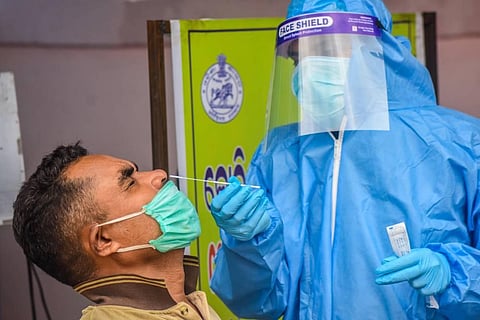

NEW DELHI: The Indian Council of Medical Research on Friday evening released a revised advisory on COVID-19 testing protocol, permitting testing on demand for the first time but also said that states can adopt the advisory with modifications - if needed.
The new guidelines, which have been put in place as per recommendations of the National COVID-19 task force, advised testing on demand for "all individuals undertaking travel to countries or Indian states mandating a negative COVID19 test at the point of entry".
It also said that all individuals who wish to get themselves tested should be allowed to do so. Experts point out that while this has already been happening in most cities over the last few months—mainly in the private sector—officially, only symptomatic individuals could ask to get tested thus far.
The new advisory has recommended that all individuals living in containment zones should be tested by rapid antigen tests, especially in cities where there has been a widespread transmission of the infection.
The health research body also insisted that no emergency procedure such as deliveries should be delayed due to lack of tests, and pregnant women should not be referred for a lack of testing facility.
Also, the existing recommendations related to testing for COVID-19 have been extended, elaborated and divided into four parts -- routine surveillance in containment zones and screening at points of entry, routine surveillance in non-containment areas, hospital settings and testing on demand -- and choice of test (RTPCR, TrueNat or CBNAAT and rapid antigen tests.
Under the category of 'routine surveillance in containment zones and screening at points of entry', the advisory recommended testing of all asymptomatic high-risk individuals including people above 65 and those with co-morbidities.
Further, it has suggested testing all symptomatic including healthcare and frontline workers. All asymptomatic direct and high-risk contacts (in family and workplace, people aged 65 and above, those who are immunocompromised or have co-morbidities etc) of a laboratory-confirmed case are to be tested once between day 5 and day 10 of coming into contact.
With regard to the choice of test, rapid antigen test is listed first, followed by RTPCR or TrueNat or CBNAAT as the second option.
"Ideally, it is suggested that 100 per cent people living in containment zones should be tested by RAT, particularly in cities where there has been widespread transmission of infection," say the new guidelines.
The latest advisory also says that home quarantine for 14 days is recommended for all individuals before undergoing elective surgery to minimise chances of infection before the procedure.